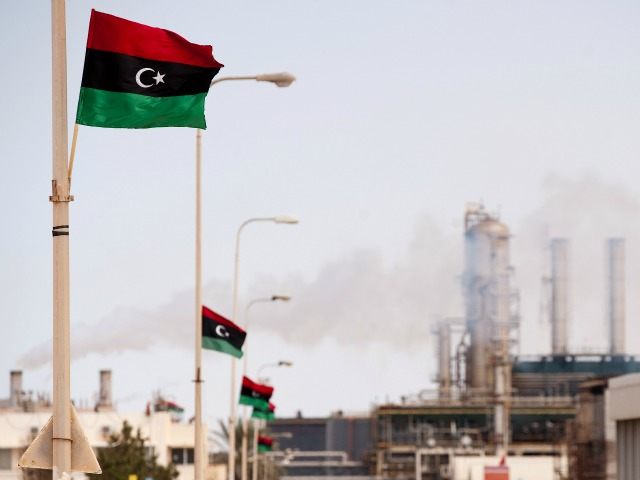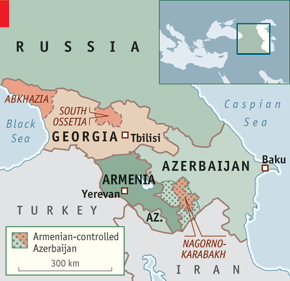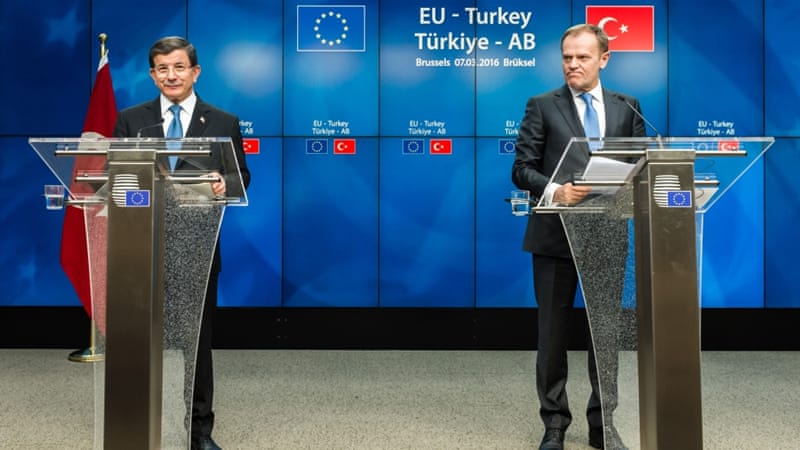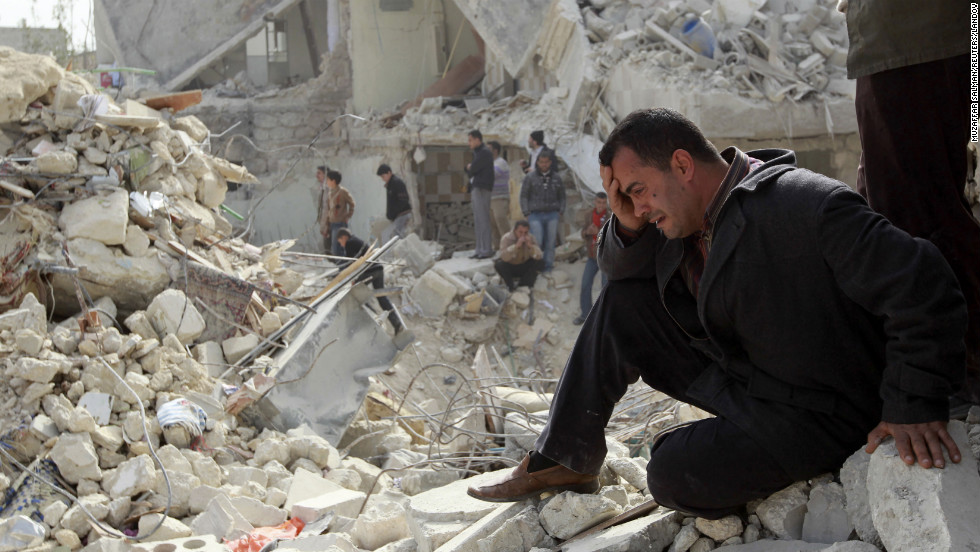[fblike]
 In 2011, the North Atlantic Treaty Organization (NATO) secured the approval of the United Nations Security Council to intervene in Libya to prevent Muammar Gaddafi from slaughtering civilians. Gaddafi was in the midst of a widespread revolt after he used violence against demonstrators that were inspired by the Arab Spring, which by that point rocked Tunisia and Egypt. However, NATO quickly moved from protecting civilians via no fly zones to regime change and in October 2011, anti-government rebels caught up to Gaddafi and executed him. Although President Obama wanted to avoid another Iraq, that is what transpired in Libya except this time no U.S. forces were committed to postwar reconstruction. Instead, Libya gradually devolved into political in-fighting and civil war and much like Iraq and Syria today, the country is under threat from the Islamic State, which is attempting to establish a foothold in the North African country to strike out at Libya’s neighbors and across the Mediterranean at Europe. Last week, in a speech at the National Defense University in Washington, President Barack Obama said that the biggest mistake of his presidency was not planning the reconstruction of Libya better, but there are some signs that things could improve. For example, the leader of a UN-approved government, Fayez al-Serraj, arrived last week to serve as Libya’s new prime minister and quickly won over some Tripoli militias and the loyalty of the heads of the central bank and national oil company. Still, al-Serraj has a tough road ahead of him to get Libya running smoothly again and he must handle militias, win over opposition legislators, and secure more economic support from the West so that Libya does not become a “Somalia on the Mediterranean” that Western policy analysts most fear.
In 2011, the North Atlantic Treaty Organization (NATO) secured the approval of the United Nations Security Council to intervene in Libya to prevent Muammar Gaddafi from slaughtering civilians. Gaddafi was in the midst of a widespread revolt after he used violence against demonstrators that were inspired by the Arab Spring, which by that point rocked Tunisia and Egypt. However, NATO quickly moved from protecting civilians via no fly zones to regime change and in October 2011, anti-government rebels caught up to Gaddafi and executed him. Although President Obama wanted to avoid another Iraq, that is what transpired in Libya except this time no U.S. forces were committed to postwar reconstruction. Instead, Libya gradually devolved into political in-fighting and civil war and much like Iraq and Syria today, the country is under threat from the Islamic State, which is attempting to establish a foothold in the North African country to strike out at Libya’s neighbors and across the Mediterranean at Europe. Last week, in a speech at the National Defense University in Washington, President Barack Obama said that the biggest mistake of his presidency was not planning the reconstruction of Libya better, but there are some signs that things could improve. For example, the leader of a UN-approved government, Fayez al-Serraj, arrived last week to serve as Libya’s new prime minister and quickly won over some Tripoli militias and the loyalty of the heads of the central bank and national oil company. Still, al-Serraj has a tough road ahead of him to get Libya running smoothly again and he must handle militias, win over opposition legislators, and secure more economic support from the West so that Libya does not become a “Somalia on the Mediterranean” that Western policy analysts most fear.
This topic brief will highlight some of the major people and vocabulary that extempers should know when talking about Libya’s problems, explain what those problems are, and then analyze what steps al-Serraj needs to take immediately to put Libya on a more stable foundation.
Readers are also encouraged to use the links below and in the related R&D to bolster their files about this topic.
Read More
 1. What steps does Pakistan need to take to better protect its Christian minority?
1. What steps does Pakistan need to take to better protect its Christian minority?



 In 2011, the North Atlantic Treaty Organization (NATO) secured the approval of the United Nations Security Council to intervene in Libya to prevent Muammar Gaddafi from slaughtering civilians. Gaddafi was in the midst of a widespread revolt after he used violence against demonstrators that were inspired by the Arab Spring, which by that point rocked Tunisia and Egypt. However, NATO quickly moved from protecting civilians via no fly zones to regime change and in October 2011, anti-government rebels caught up to Gaddafi and executed him. Although President Obama wanted to avoid another Iraq, that is what transpired in Libya except this time no U.S. forces were committed to postwar reconstruction. Instead, Libya gradually devolved into political in-fighting and civil war and much like Iraq and Syria today, the country is under threat from the Islamic State, which is attempting to establish a foothold in the North African country to strike out at Libya’s neighbors and across the Mediterranean at Europe. Last week, in a speech at the National Defense University in Washington, President Barack Obama said that the biggest mistake of his presidency was not planning the reconstruction of Libya better, but there are some signs that things could improve. For example, the leader of a UN-approved government, Fayez al-Serraj, arrived last week to serve as Libya’s new prime minister and quickly won over some Tripoli militias and the loyalty of the heads of the central bank and national oil company. Still, al-Serraj has a tough road ahead of him to get Libya running smoothly again and he must handle militias, win over opposition legislators, and secure more economic support from the West so that Libya does not become a “Somalia on the Mediterranean” that Western policy analysts most fear.
In 2011, the North Atlantic Treaty Organization (NATO) secured the approval of the United Nations Security Council to intervene in Libya to prevent Muammar Gaddafi from slaughtering civilians. Gaddafi was in the midst of a widespread revolt after he used violence against demonstrators that were inspired by the Arab Spring, which by that point rocked Tunisia and Egypt. However, NATO quickly moved from protecting civilians via no fly zones to regime change and in October 2011, anti-government rebels caught up to Gaddafi and executed him. Although President Obama wanted to avoid another Iraq, that is what transpired in Libya except this time no U.S. forces were committed to postwar reconstruction. Instead, Libya gradually devolved into political in-fighting and civil war and much like Iraq and Syria today, the country is under threat from the Islamic State, which is attempting to establish a foothold in the North African country to strike out at Libya’s neighbors and across the Mediterranean at Europe. Last week, in a speech at the National Defense University in Washington, President Barack Obama said that the biggest mistake of his presidency was not planning the reconstruction of Libya better, but there are some signs that things could improve. For example, the leader of a UN-approved government, Fayez al-Serraj, arrived last week to serve as Libya’s new prime minister and quickly won over some Tripoli militias and the loyalty of the heads of the central bank and national oil company. Still, al-Serraj has a tough road ahead of him to get Libya running smoothly again and he must handle militias, win over opposition legislators, and secure more economic support from the West so that Libya does not become a “Somalia on the Mediterranean” that Western policy analysts most fear. Last weekend fighting resumed between Armenian separatists and Azerbaijan-backed forces in the disputed region of Nagorno-Karabakh. The remote territory, located within Azerbaijan territory, is largely Armenian in ethnic composition and since 1994 it has been controlled by rebels that wish to detach it from Azerbaijan and make it an independent entity. Azerbaijan has long wished to regain it, but anxiety about how a takeover would be perceived by Armenians in the area, as well as the strong defensive position of separatist forces has prevented it from taking action up to now. Why the current fighting began is still a mystery as both sides accuse the other of taking offensive action first. While it would be easy to dismiss the conflict as a local affair, Turkey and Russia, both of whom are still smarting over a confrontation in Syria last fall, back opposite sides in the conflict, with Turkey casting its lot behind Muslim Azerbaijan and Russia having a defense treaty with Christian Armenia. Although the conflict appeared to be winding down as of the time of this brief, it could flare up again in the near future and create much more instability in Europe’s borderlands.
Last weekend fighting resumed between Armenian separatists and Azerbaijan-backed forces in the disputed region of Nagorno-Karabakh. The remote territory, located within Azerbaijan territory, is largely Armenian in ethnic composition and since 1994 it has been controlled by rebels that wish to detach it from Azerbaijan and make it an independent entity. Azerbaijan has long wished to regain it, but anxiety about how a takeover would be perceived by Armenians in the area, as well as the strong defensive position of separatist forces has prevented it from taking action up to now. Why the current fighting began is still a mystery as both sides accuse the other of taking offensive action first. While it would be easy to dismiss the conflict as a local affair, Turkey and Russia, both of whom are still smarting over a confrontation in Syria last fall, back opposite sides in the conflict, with Turkey casting its lot behind Muslim Azerbaijan and Russia having a defense treaty with Christian Armenia. Although the conflict appeared to be winding down as of the time of this brief, it could flare up again in the near future and create much more instability in Europe’s borderlands. On March 22 the Belgian capital of Brussels was rocked by two suicide attacks. One took place at the American Airlines counter at Zaventern airport and the other took place at a nearby subway station. As of the time of this brief, at least thirty-one people were reported killed and another 270 were reported wounded. The Islamic State quickly claimed responsibility for the attacks and investigators wonder if there was a link between the attack and the arrest of Salah Abdeslam, considered the lone survivor of the Paris terror attacks last year. Belgium has acquired a reputation as a terror hotbed of Europe, with militants using Brussels and other Belgian cities as planning centers for other attacks throughout Europe and the world. The attacks will likely cause the Belgian government to bolster its security infrastructure and rethink some of its policies regarding the integration of immigrants from Islamic nations. And the attacks will likely bolster a right-wing critique of existing security policies within the European Union (EU) that they say make the continent more vulnerable to attack.
On March 22 the Belgian capital of Brussels was rocked by two suicide attacks. One took place at the American Airlines counter at Zaventern airport and the other took place at a nearby subway station. As of the time of this brief, at least thirty-one people were reported killed and another 270 were reported wounded. The Islamic State quickly claimed responsibility for the attacks and investigators wonder if there was a link between the attack and the arrest of Salah Abdeslam, considered the lone survivor of the Paris terror attacks last year. Belgium has acquired a reputation as a terror hotbed of Europe, with militants using Brussels and other Belgian cities as planning centers for other attacks throughout Europe and the world. The attacks will likely cause the Belgian government to bolster its security infrastructure and rethink some of its policies regarding the integration of immigrants from Islamic nations. And the attacks will likely bolster a right-wing critique of existing security policies within the European Union (EU) that they say make the continent more vulnerable to attack. The European migrant crisis was arguably the biggest international news story of 2015. More than a million migrants poured into Europe last year, fleeing violence in Syria, Iraq, Afghanistan, and Libya. At first, European leaders such as German Chancellor Angela Merkel were welcoming of refugees, but the sheer number of new arrivals overwhelmed countries such as Greece and triggered a backlash, especially among conservatives that feared that the flood would radically alter Europe’s demographics and culture. The Parisian terror attacks in November, as well as accusations that refugees attacked women in Cologne, Germany, bolstered the case for limiting new arrivals and it appears that the European Union (EU) has reached a deal with Turkey to do just that. The deal calls for Turkey to take in refugees that fail to acquire asylum in Europe, while Europe will provide billions in aid for Turkey to deal with refugees. Also, Turkey’s aspirations of joining the EU have been revived, with the EU pledging to open new chapters in those delayed negotiations and promising that Turkish nationals will have access to the organization’s visa-free travel zone by June. However, skeptics say that this deal is unworkable from a logistics and legal point-of-view. They argue that Turkey is not safe for migrants and that the EU is absconding of its responsibility to help the world’s less fortunate.
The European migrant crisis was arguably the biggest international news story of 2015. More than a million migrants poured into Europe last year, fleeing violence in Syria, Iraq, Afghanistan, and Libya. At first, European leaders such as German Chancellor Angela Merkel were welcoming of refugees, but the sheer number of new arrivals overwhelmed countries such as Greece and triggered a backlash, especially among conservatives that feared that the flood would radically alter Europe’s demographics and culture. The Parisian terror attacks in November, as well as accusations that refugees attacked women in Cologne, Germany, bolstered the case for limiting new arrivals and it appears that the European Union (EU) has reached a deal with Turkey to do just that. The deal calls for Turkey to take in refugees that fail to acquire asylum in Europe, while Europe will provide billions in aid for Turkey to deal with refugees. Also, Turkey’s aspirations of joining the EU have been revived, with the EU pledging to open new chapters in those delayed negotiations and promising that Turkish nationals will have access to the organization’s visa-free travel zone by June. However, skeptics say that this deal is unworkable from a logistics and legal point-of-view. They argue that Turkey is not safe for migrants and that the EU is absconding of its responsibility to help the world’s less fortunate. Last week’s Iranian elections were billed as the most significant in decades as reformist, moderate, and conservative candidates vied for seats in the nation’s parliament (called the Majlis) and its Assembly of Experts, the body that selects the nation’s Supreme Leader. The elections appeared to be a triumph for moderate President Hassan Rouhani, with reformist and moderate candidates sweeping all of the seats in Tehran and returning to the Majlis for the first time since 2012. Moderate candidates also did well in the Assembly of Experts elections, apparently winning fifty-one of the eighty-eight available seats. In a campaign that was marred by accusations of Western interference by the nation’s conservatives, Rouhani successfully rallied Iranians around the benefits of the recent nuclear deal and appears poised to push for more economic and social reforms before Iran holds its presidential election next year. This could make Iran a growing superpower in the Middle East, but extempers should be cautious of reading too much significance into the elections as hardliners continue to control the Islamic Republic’s primary institutions.
Last week’s Iranian elections were billed as the most significant in decades as reformist, moderate, and conservative candidates vied for seats in the nation’s parliament (called the Majlis) and its Assembly of Experts, the body that selects the nation’s Supreme Leader. The elections appeared to be a triumph for moderate President Hassan Rouhani, with reformist and moderate candidates sweeping all of the seats in Tehran and returning to the Majlis for the first time since 2012. Moderate candidates also did well in the Assembly of Experts elections, apparently winning fifty-one of the eighty-eight available seats. In a campaign that was marred by accusations of Western interference by the nation’s conservatives, Rouhani successfully rallied Iranians around the benefits of the recent nuclear deal and appears poised to push for more economic and social reforms before Iran holds its presidential election next year. This could make Iran a growing superpower in the Middle East, but extempers should be cautious of reading too much significance into the elections as hardliners continue to control the Islamic Republic’s primary institutions. In less than a month, the war in Syria will be entering its fifth year. The conflict has led to the deaths of more than 250,000 people, injured more than a million others, and displaced half of the country’s population. Syrian President Bashar al-Assad appeared headed for defeat in the fall, but the intervention of Russia rescued his regime and has allowed him to reverse the momentum of the conflict. President Barack Obama has refused to provide sufficient support for Syria’s rebel factions, hesitant to get America involved in another sectarian war in the region and despairing that there are no “good” forces to support in the conflict. Experts note that the war has become a proxy battle of American and Russian influence in the Middle East and that a wider war cannot be discounted between Sunni and Shi’ite powers. The United States and Russia have recently agreed to move toward a “cessation of hostilities” later this week, but the agreement excludes attacks on terrorist groups and the tortured nature of that term is likely to help Assad solidify his gains and potentially win the war with significant ramifications for U.S. foreign policy in the Middle East.
In less than a month, the war in Syria will be entering its fifth year. The conflict has led to the deaths of more than 250,000 people, injured more than a million others, and displaced half of the country’s population. Syrian President Bashar al-Assad appeared headed for defeat in the fall, but the intervention of Russia rescued his regime and has allowed him to reverse the momentum of the conflict. President Barack Obama has refused to provide sufficient support for Syria’s rebel factions, hesitant to get America involved in another sectarian war in the region and despairing that there are no “good” forces to support in the conflict. Experts note that the war has become a proxy battle of American and Russian influence in the Middle East and that a wider war cannot be discounted between Sunni and Shi’ite powers. The United States and Russia have recently agreed to move toward a “cessation of hostilities” later this week, but the agreement excludes attacks on terrorist groups and the tortured nature of that term is likely to help Assad solidify his gains and potentially win the war with significant ramifications for U.S. foreign policy in the Middle East.